Graduate student spotlight: Andres Orco

The College of Music is committed to supporting students in expanding their skill sets through certificate programs in a variety of areas. Venezuelan Andres Orco is a DMA guitar student in our Thompson Jazz Studies Program with a special interest in advanced rhythm and meter in jazz; as such, he’s also pursuing a Certificate in Music Theory.
“I was drawn to CU Boulder for many reasons,” shares Orco, who earned a bachelor’s in music from the Berklee College of Music and a master’s in music from the New England Conservatory. “The faculty in both the jazz and theory departments, the student-faculty ratio and the teaching opportunities afforded to me as a Teaching Assistant.”
For his Certificate in Music Theory project, by combining music theory with ethnography, Orco analyzed modern repertoire and interviewed 15 professional jazz musicians including Vijay Iyer, Terri Lyne Carrington, Miguel Zenon and Mary Halvorson.
“The certificate is a pared-down master’s in music theory. I have always gravitated toward music theory, although I was more interested in studying jazz. Through the certificate program, I received a multidisciplinary education that has made me a more well-rounded musician and educator.”
Evolution of 21st-century jazz
“Jazz has always been an exceptionally sophisticated music. In the past 30 years, there’s been an increase in the use of rhythmic complexity, such as polyrhythms, asymmetrical meters and displacement as a compositional tool,” says Orco. “The modern jazz musician—coming from a tradition of rhythmic sophistication in improvisation—is now expressing rhythmic ambiguity in already ambiguous spaces. This, in my opinion, is an evolutionary marker in the music.”
Current theoretical literature isn’t sufficient to explain modern jazz
“There are two reasons why the current theoretical literature isn’t sufficient to explain modern jazz,” continues Orco. “First, most scholars discussing rhythm and meter in music have focused on Western classical music. As a result, analytical models have biases that can sometimes work when analyzing jazz … but often falter. Rules have to be broken and the music is essentially made to conform to the model, rather than the other way around.
“Second, the jazz literature is almost entirely dedicated to a 20-year period, 1940 to 1960. Given how much the music has changed, it’s very important to research modern repertoire to continue the discussion into the 21st century.”
Amplifying the voices of expert jazz practitioners in theoretical discussions of their music
According to Orco, “While slowly settling as an academic discipline, jazz is still an oral tradition. Some of the most important theorists and historians are the players themselves, who understand this music from every aspect—theoretical, historical and embodied.
“Some recent articles discussing modern jazz simply get it wrong, and my ethnographic findings demonstrate there is a conflict between the literature and practitioner’s perspective. Scholars overlooked important organizing elements endemic in jazz and, as a result, their interpretations conflict with how jazz musicians would normally understand and analyze the music. Including the perspective of professional jazz musicians is both ethically valuable and provides ecological validity to the analysis of music.”
He explains, “Ecological validity is a judgment made on research. Essentially, it’s whether the conclusions and findings have any relevance to the studied population—‘real world’ versus study. In this case, the academic discussion of music is often not ecologically valuable because it operates in a vacuum. It’s an analysis of music as a product rather than as a practice, where only scholars are in dialogue with it … and it goes nowhere beyond a journal. Including the actual practitioner of the music involves members of the broader population, discusses the music from both practical and analytical perspectives, and is more relevant to the ‘real world’ because of the dual perspective.
“Ethical value builds from the same idea, but refers to the notion that it is ethically important to include the voice of the practitioner in jazz. Too often, this has not been the case … despite the fact that jazz is an oral tradition and some of the most knowledgeable historians and theorists of the music are the actual musicians themselves.”
An active performer in the Denver metro area, Orco is also focused on writing guitar pedagogy books and teaching aspiring guitarists of all levels and ages.


